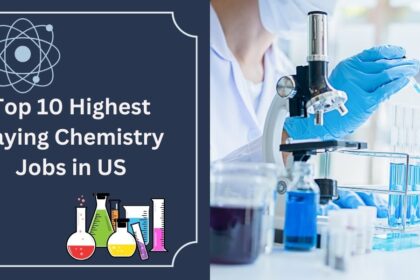How to Become a Pharmacist in New Jersey: Choosing a good pharmacy school is the beginning of your success story as a pharmacists.
Becoming a pharmacist in New Jersey means you have completed a four-year program in a pharmacy school.
Most students need four years to complete their prerequisite courses.
Thus, it usually takes eight years of college study to earn a Pharm. D. and become a pharmacist.
Therefore, today we shall be covering all the necessary criteria to become a Pharmacist in New Jersey.
Who is a Pharmacist in New Jersey?
Pharmacists are healthcare professionals who specialize in the right way to use, store, preserve, and provide medicine.
They can, however, guide you on how to use medications, and let you know about any potential adverse effects of what you take.
And also fill prescriptions issued by doctors and other healthcare professionals.
Pharmacists also contribute to the research and testing of new drugs. They work in pharmacies, medical clinics, hospitals, universities, and government institutions.
Pharmacists distribute prescription drugs to individuals. They also provide advice to patients and other health professionals on how to use or take medication, the correct dose of a drug, and potential side effects. Plus, they can make sure that a drug won’t interact badly with other medications you take or health conditions you have.
They can also provide information about general health topics like diet and exercise, as well as advice on products like home healthcare supplies and medical equipment.
Pharmacists are qualified to answer most medical or drug-related questions you may have. They can explain what each medication you’re taking is for, how you are supposed to take it, and what you can expect while on the medication.
Read also: How to Become a Child Psychologist and Salary
What is a Pharmacist in New Jersey’s Average Salary?
the average annual pay for a Pharmacist in New Jersey is $103,111 a year. Just in case you need a simple salary calculator, that works out to be approximately $49.57 an hour. This is the equivalent of $1,983/week or $8,593/month.
While ZipRecruiter is seeing salaries as high as $136,524 and as low as $42,007, the majority of Pharmacist salaries currently range between $99,289 (25th percentile) to $120,770 (75th percentile) with top earners (90th percentile) making $130,317 annually in New Jersey.
The average pay range for a Pharmacist varies little (about $21,481), which suggests that regardless of location, there are not many opportunities for increased pay or advancement, even with several years of experience.
Based on recent job posting activity on ZipRecruiter, the Pharmacist job market in New Jersey is not very active as few companies are currently hiring.
Read also: List of Jobs that Require Advanced Training but no College Degree
Where Can you Pursue This Degree in New Jersey?
Becoming a pharmacist in New Jersey is beyond passion and desire to serve humanity. The basic requirement entails completing at least a four-year program in a Pharmacy school.
Choosing which pharmacy school to attend should not pose a challenge.
Requirements
Most pharmacists schools in New Jersey demand intending students to be science inclined. Basically, requirements for pharmacy schools in NJ will solely depend on the pharmacy program you are enrolling for and the school.
For undergraduate degree programs in NJ, it is also important you complete high school. Postgraduate pharmacy degree programs in NJ require students to complete physical and biological types of study also.
In addition, pharmacy schools in New jersey demand students have a specific grade point average and GRE scores. You should visit your school website to know the exact GPA required, or read this piece to the end.
Read also: How Long does it Take to be a Pharmacy Tech
Estimated Tuiton Cost for Pharmacy Schools in New Jersey
Pharmacy schools are quite expensive and cost between $65,000 -$200, 000. In the US, low-cost pharmacy schools cost between $15,000 to $20,000 per year.
It is important to note that the figure above may does not include living expenses and other miscellaneous fees. According to data readily available on student loan planners, NJ pharmacy schools are not enlisted in low-cost pharmacy schools in the US.
Best Pharmacy Schools in New Jersey
Below are some of the best schools to choose from if you wish to become a pharmacist in New Jersey.
- Rutgers University-New Brunswick. New Brunswick, NJ
- New Jersey Institute of Technology. Newark, NJ
- Fairleigh Dickinson University-Metropolitan Campus. Teaneck, NJ
- Thomas Edison State University
- Montclair State University
- Seton Hall University
- Rowan University
Licensure for the profession of a Pharmacist in New Jersey
To qualify for licensure in the state of New Jersey, the applicant must be a graduate of an accredited college of pharmacy, must have completed a sufficient amount of time in an approved experience program, and must have passed both the state Board of Pharmacy Licensure Examination and the Multistate Jurisprudence Pharmacy Examination.
The experience program may, therefore, consist of an internship, externship, or a combination of both.
Externship refers to a college-credited and supervised experience program that has been approved by the Board of Pharmacy as meeting the experience requirement.
Internship, on the other hand, refers to the postgraduate experience in an approved pharmacy with a board-approved preceptor.
A total of 1,000 hours of internship/externship is necessary for a candidate to qualify to take the licensure examination.
The examination itself is a comprehensive computer-adaptive examination that integrates the pharmaceutical sciences with pharmacy practice.
Read also: How to Become a Pharmacist in India: Scopes and Colleges
Conclusion
While a bachelor’s degree in a related field can set you up for a doctorate-level pharmacy education, a pre-pharmacy program offers a faster path. Assuming a typical class load, a bachelor’s degree takes about four years; a pre-pharmacy program takes roughly two.


 Jobi.ng
Jobi.ng





